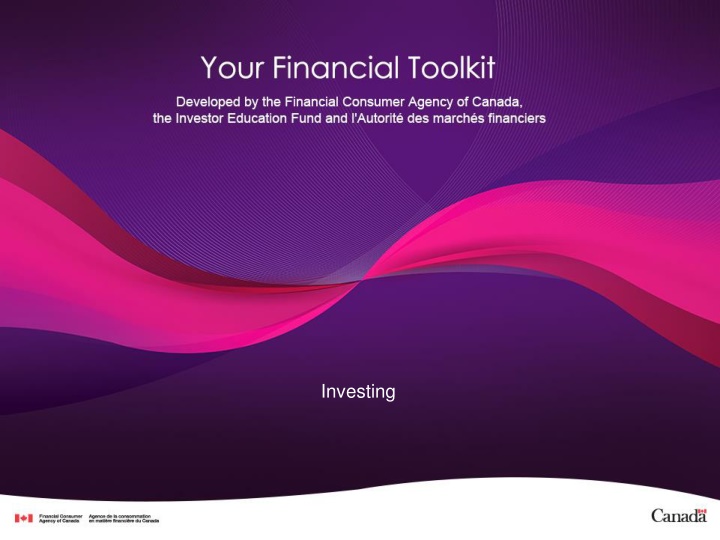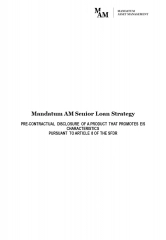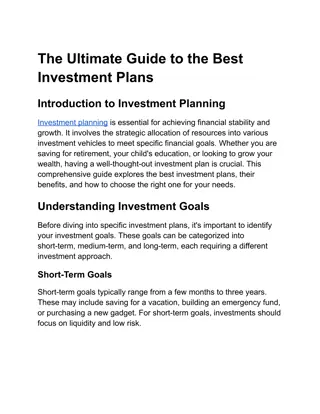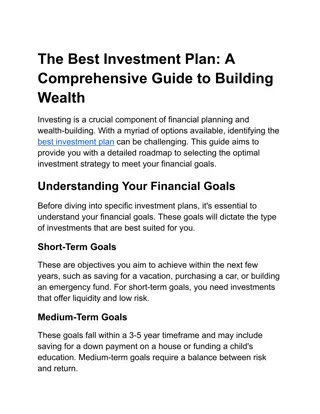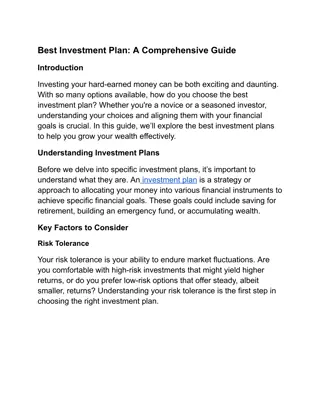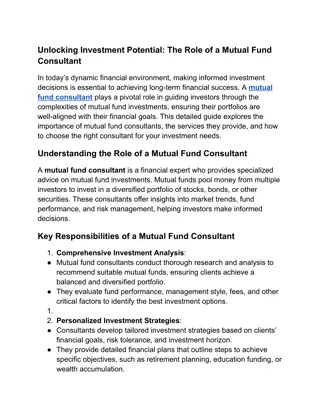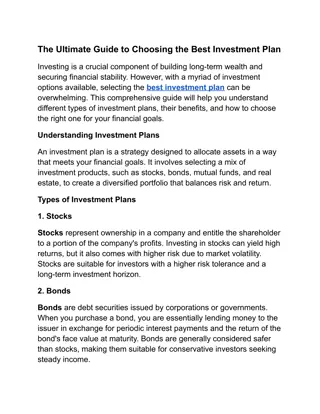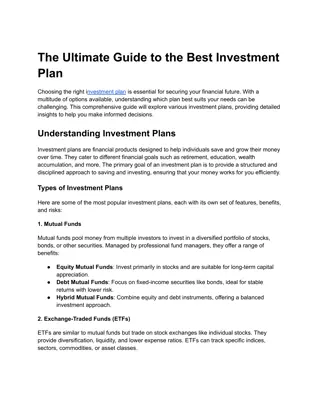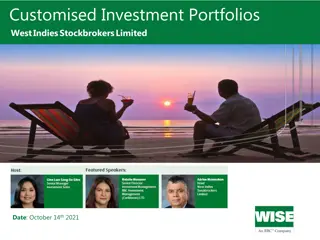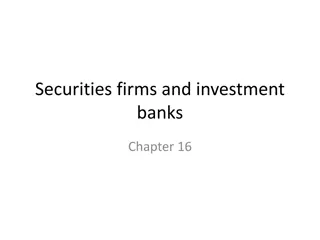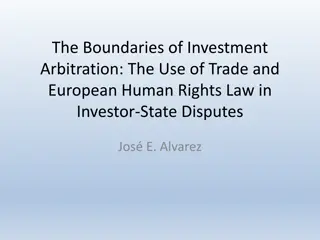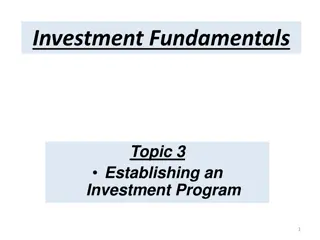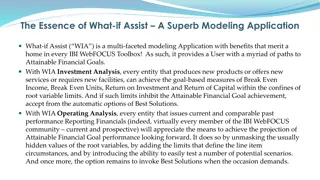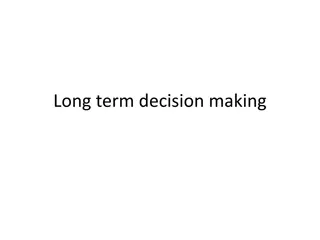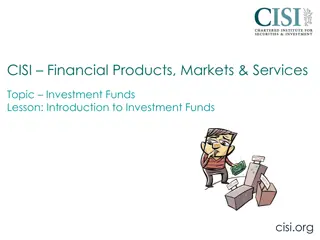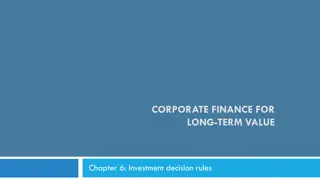Mastering Your Investment Goals: A Comprehensive Guide
This comprehensive guide on investing covers setting appropriate goals, understanding key investment characteristics, working with professionals, safeguarding against scams, assessing risk tolerance, and aligning personal values with investment choices. Learn to define and prioritize your financial objectives, identify different investment strategies, and create a customized plan to achieve your goals. Explore the importance of self-assessment, risk management, and adapting to evolving financial needs in the dynamic world of investments.
Download Presentation

Please find below an Image/Link to download the presentation.
The content on the website is provided AS IS for your information and personal use only. It may not be sold, licensed, or shared on other websites without obtaining consent from the author.If you encounter any issues during the download, it is possible that the publisher has removed the file from their server.
You are allowed to download the files provided on this website for personal or commercial use, subject to the condition that they are used lawfully. All files are the property of their respective owners.
The content on the website is provided AS IS for your information and personal use only. It may not be sold, licensed, or shared on other websites without obtaining consent from the author.
E N D
Presentation Transcript
Agenda Start time: _____ Break time: _____ (10 minutes) End time: _____ Please set phones to silent ring and answer outside of the room.
Investing This module covers: How to set appropriate investing goals The key characteristics of investments (their return, risk and liquidity) The main types of investments that you are likely to encounter How to work with an investment professional Your rights and responsibilities when investing How to keep your money safe from investment scams
Investing goals This section covers: Personal values, emotions and behaviours that affect your investment choices Your knowledge about investing Your goals related to investing
Investing goals Investing goals guide you in choosing investing strategies that suit your needs Define what you are saving for and the time frame Set a target amount and deadline You will have several different goals; e.g.: o Save to pay off $500 in debts by December 31 o Save $5,000 for education by 2025 o Save $150,000 for retirement by 2040 Goals may conflict and change over time
Investing profile Know yourself o When will you need to use your money? o Do you need regular income or will you sell to take a profit? o Can you be flexible about when you use your money? o How much risk are you comfortable with? Investor profile helps understand what investments best suit your needs
Risk tolerance Higher returns mean higher risks How comfortable are you if: o You can t guarantee what your investments will make? o The value of your investments rises and falls? o You know your investment could lose some or all of its value? Your tolerance for risk is part of your profile
Saving, investing and debt Save at least 10 percent of your pay if you can Save an emergency fund Paying off debts often provides the best return Consider investing your savings
Personal values, emotions and behaviours In addition to financial factors, be aware of your personal factors: o Emotions o Habits o Behaviours o Values These can affect investing decisions, for better or worse
Summary of key messages Understand the investing basics Set clear investing goals Know yourself: o Understand your investor profile o Know your tolerance for risk o Be aware of your emotions, habits, values and behaviours Consider paying off debt before investing
About investments This section covers: The main characteristics of an investment: o Return o Risk o Liquidity The importance of diversification when choosing investments
Return The profit an investor makes on an investment Income money you receive while you own the investment o Interest money paid to you at a certain percentage o Dividends part of a company s profits paid to each shareholder o Rent money you receive for the use of property Increased value the profit from selling investments for more than you paid o Capital gain (or capital loss)
Risk The amount of uncertainty about what you ll get on an investment. Many kinds of risk: o Uncertainty about what the return will be o The chance you will lose some or all of the investment o The ability to judge the value of an investment
Risk vs. expected return Higher expected return means higher risk and higher potential for losses
Liquidity The ability to cash in or sell an investment quickly at or near the current market price High liquidity: listed stocks, government bonds, etc. Lower liquidity: real estate, business property, etc. Low liquidity: term deposits, collectibles, etc.
Diversification Getting a mix of investments Don t put all your eggs in one basket Diversify investments by: o Choosing different types of investments o Choosing different companies or industries o Choosing investments in different geographical areas
Summary of key messages Every investment can be described in terms of its return, risk and liquidity For a high return, you must accept a higher risk Your tolerance for risk affects your investment choices Reduce risk with a diversified portfolio Get advice from a registered investment professional
Types of investments This section covers: The main investments that a beginning investor will come across The effect of taxes when you are investing Key questions to ask about an investment
Main types of investments Property o Real estate, personal property, business property Investments that pay interest o Bonds, term deposits, GICs, T-bills Stocks o Common stocks, preferred stocks Investment funds o Mutual funds, exchange traded funds, etc.
Summary of key messages There are many possible investments, each with different characteristics The return on investment can change and is often impossible to predict Registered savings plans provides some protection from taxes Get the information you need before making an investment
Investment advisors This section covers: How to choose an investment advisor Fees and costs, and how they affect your investment How to read your investment account statement Your rights and responsibilities when you work with an advisor
Types of investment advisors Advisors at work Advisors at a financial institution Advisors at mutual fund companies and investment dealers Advisors at insurance companies Advisors for investors with a large amount of money
Where to look for an advisor Financial institutions Friends, family, work associates and other professionals Industry groups Securities regulators
Fees and costs Fees and costs reduce your return. They may include: Service fees o Hourly, by transaction or portfolio Sales fees and commissions o Direct or indirect Salaries o Built into price or service fee Management fees
Investor rights You have a right to: o Receive your advisor s best advice o Receive timely and accurate information about your account o Know if your advisor has a conflict of interest regarding your investments If you have concerns, talk to your advisor If necessary, contact a supervisor or regulator
Investor responsibilities You have a responsibility to: o Know yourself, your investments and your advisor s role o Communicate your goals and instructions o Read your account statements o Keep records
Summary of key messages There are many types of financial advisors Advisors must be registered to advise on investments Fees reduce the net income you receive Fees may be charged directly or built into the cost The investment account statement provides monitoring information Investors have both rights and responsibilities
Investment fraud This section covers: How vulnerable you may be to the risk for investment scams Guidelines on spotting investment scams and tips to avoid them What to do if you suspect an investment is a scam
Red flags of fraud Promise of high returns with no risk Contact by someone you don t know Pressure to act fast or keep an investment secret Irregular paperwork Advance fees Transactions carried out without your consent
How to avoid investment scams Check that the seller is registered Research the company and its personnel Ask questions and get clear answers Get reliable official documents Get independent advice Don t rely on tips, inside information or irregular procedures Take time to think
If you are the target of a scam Don t give out your personal information Research the investment Check the seller s and the company s registration Check investor warning lists Contact your securities regulator Report investment scams
Summary of key messages If an offer looks too good to be true, it probably is Scam artists use many tricks to deceive investors Reduce your risk of fraud by watching for the red flags If you are aware of a potential fraud, report it as soon as possible
